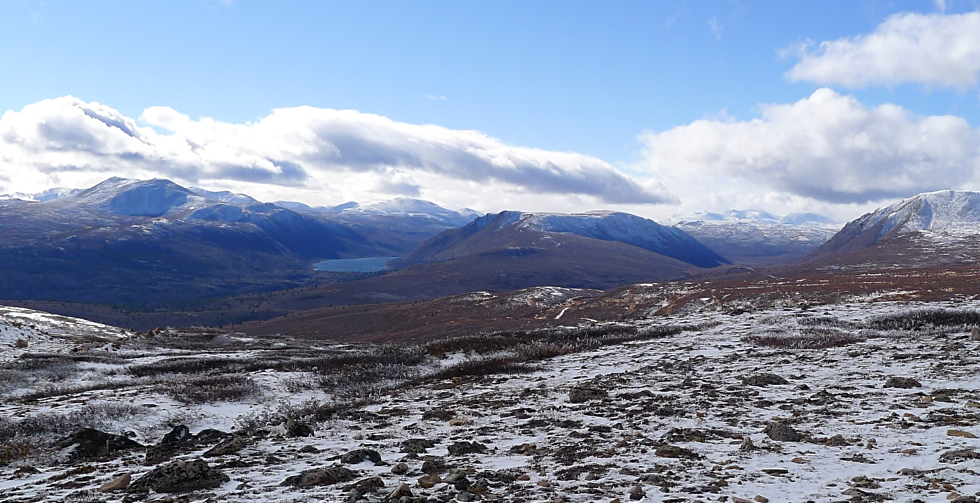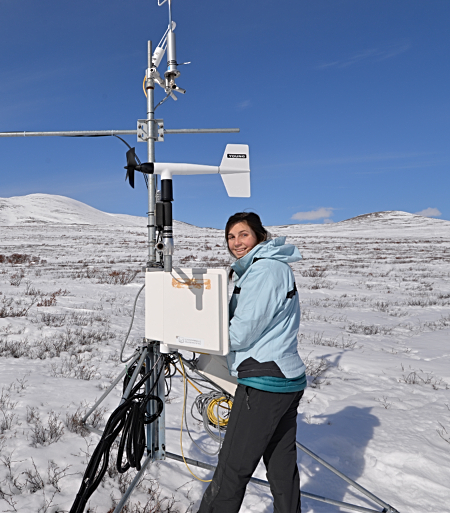“It’s shocking to see how fast these mountains are changing”

BY Erica Balch
June 4, 2018
Over the past 25 years, McMaster researcher Sean Carey has seen first-hand the profound changes taking place in the mountainous, subarctic landscape of Yukon’s Wolf Creek research basin.
Vast and pristine, Wolf Creek is a place that in winter can often only be accessed by helicopter or snow machine. Made up of dense forests, mountains and tundra, its network of observatories and research sites can be so difficult to reach that Carey and his team sometimes camp in the wilderness for months on end to conduct their research.
It’s from this remarkable living laboratory that Carey has been monitoring the dramatic changes occurring in mountain regions as a result of climate change and monitoring their significant impact on the water cycle.
“It’s shocking to see how fast these mountains are changing” says Carey, a hydrologist and professor in the School of Geography and Earth Sciences, who leads the research taking place at Wolf Creek, an internationally recognized research site.

“Cold is critical in mountain regions, and we’re losing cold,” he explains. “Things that were always there like snow packs that have persisted thousands of years are gone, ground that was frozen has thawed, vegetation is growing that never used to be there, storms in the mountains are becoming more severe – all this is having a huge influence on the water cycle.”
Carey is the lead researcher of Mountain Water Futures, part of the Global Water Futures* research initiative. His project is aimed at understanding the changes taking place in the complex mountain ecosystems of western Canada and, using a range of cutting-edge technologies and computer modelling, better predict the water cycle to enable governments, industry and NGOs to plan for, and manage water risks.
“The western mountains supply much of the water for public use, hydro-electric power generation, agriculture, and industry west of the Great Lakes,” says Carey. “So it’s all about managing mountain water. Will there be enough water to irrigate crops? Are communities in low-lying areas at risk for flooding? Water managers need to know so they can plan and adapt.”
To learn more, Carey and his research team are collecting a wide-range of data at Wolf Creek. Meteorological stations placed throughout the basin are tracking climate and weather patterns. Large flux towers that rise above the forest measure how trees breathe and how they cycle water. In addition, researchers are monitoring the thawing of the permafrost, as well as the timing of the snow-melt and its impact on water levels in streams.
They are also studying the ecosystems of Wolf Creek, which have been changing dramatically as a result of higher temperatures and wetter conditions brought on by global warming.

McMaster PhD student Erin Nicholls is working with Carey to learn more about how the rapid and unprecedented changes in vegetation are impacting the water cycle and affecting the overall water balance in the mountains.
“Vegetation serves as a primary control of precipitation reaching the ground surface,” says Nicholls, who explains that plants play a critical role in water cycling, intercepting the rain or trapping the snow. The amount and type of vegetation impacts how much water soaks into the ground, affecting the re-filling of aquifers, as well as the flow of water that feeds streams and rivers.
Equally important, says Nicholls, is the role of evapotranspiration – the amount of water lost due to evaporation from soil, vegetative surfaces and lakes – in combination with the water lost to the atmosphere through transpiration, the water lost to the atmosphere through the pores of leaves during photosynthesis.
To understand the impact of vegetation on water cycling, Nicholls is surveying different mountain landscapes, from forests to tundra, to learn more about the types and characteristics of vegetation found at different latitudes, altitudes, temperatures, and terrains. She is also trying to determine how much water is being lost through evapotranspiration using technologies like Eddy Covariance towers that measure water and carbon flux, as well as sap-flow sensors that measure transpiration.
While it’s still unclear how the expansion of vegetation in mountain regions will impact the availability of water, Nicholls hopes her research will provide new insights which can then be applied to larger mountain watersheds across Canada’s western mountains, and in mountain regions globally.
Sean Carey says this, and other Mountain Water Futures projects, will ultimately contribute to improved scientific understanding of the changes taking place in mountain regions – now and in the future – and help inform the water management strategies that will be critical to adapting to climate change.
“Every prediction that has ever been made about climate warming and its impacts has been surpassed,” he says. “So as the glaciers disappear, as the frozen ground thaws, as the timing and sequence of precipitation changes – how will that affect our water resources? These are the kinds of things we need to understand to respond to the challenges of a warmer world.”
*Global Water Futures is aimed at delivering risk management solutions—informed by leading-edge water science — to manage water futures in Canada and other cold regions where global warming is changing landscapes, ecosystems, and the water environment. GWF includes researchers from The University of Saskatchewan, McMaster University, the University of Waterloo, and Wilfrid Laurier University.
McMaster is hosting the inaugural GWF Annual Science Meeting from June 3 – 6, 2018.


